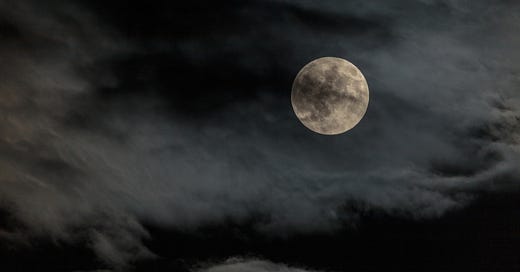Thank you RawPixel for image above
The next full moon will be this coming Monday, Aug. 19 at 2:26 p.m. EDT.
The full moon has long been a source of fascination, inspiring countless myths and legends about its impact on human behavior. From ancient times to modern-day discussions, the idea that the moon affects our moods, actions, and overall well-being persists. But is there any scientific basis for this belief, or is it merely an intriguing myth? Today’s entry delves into the so-called "full moon effect," exploring whether the lunar cycle truly influences human behavior, the “lunar-lunacy” connection. I thank Chat GPT for assisting me in the editing of this entry.
Three Indisputable Truths
1. Yours truly consistently sleeps poorly whenever there is a full moon.
2. At the time of a full moon and for a few days thereafter, our office patient population is often our most challenging and difficult.
3. I have queried many others health workers (nurses and physicians) who concur with our office experience.
So, my answer to the full moon effect is, in the words of Bill Maher: “I don’t know it for a fact, I just know it to be true.”
Understanding the Lunar Effect
The term "lunar effect" refers to the proposed connection between the lunar cycle and changes in human behavior or physiological states. This concept suggests that the full moon might influence various aspects of our lives, from mood swings to increased hospital admissions. Historically, words like "lunacy" and "lunatic" have been linked to the moon, reflecting the ancient belief that lunar phases could affect mental health. The word “moonstruck” refers to how the moon can affect the mind. However, the question remains: Is there real scientific evidence to support these age-old notions?
Clinical Observations and Anecdotal Evidence
Many healthcare professionals, including nurses and physicians, have reported observing an increase in challenging patient behaviors around the time of a full moon. For instance, some clinicians note that their patient population becomes more difficult to manage during these periods. Anecdotal evidence suggests that full moons may coincide with higher rates of psychiatric emergencies, aggressive behaviors, and increased hospital visits.
Such observations can be compelling, but they are not definitive proof of a causal relationship. They often reflect the complexities of healthcare environments, where numerous factors—beyond the lunar cycle—affect patient behavior and clinical outcomes.
Scientific Studies and Findings
Recent research suggests that the lunar cycle has a subtle influence on human behavior—specifically when it comes to cyclical phenomena such as sleep, the female menstrual cycle, and the periodic mood swings of those with bipolar disorder.
A recent University of Washington study tracked sleep patterns in two disparate populations, an Indigenous community in rural Argentina and University of Washington undergraduate students. Both populations experienced less sleep on the nights leading up to a full moon.
However, scientific research on the lunar effect presents a mixed picture. Some studies have indeed found correlations between the full moon and increased psychiatric emergency room visits or aggressive behaviors. For example, a few investigations have reported higher incidences of psychiatric admissions or violent incidents during full moons. However, these studies often face methodological limitations, and their findings are not universally accepted.
Several well-conducted studies have found no significant relationship between the lunar cycle and human behavior or healthcare utilization. The scientific literature on this topic remains contradictory, with some studies affirming a lunar influence while others refute it. The lunar jury is out!
Possible Explanations
If the lunar effect does exist, its mechanism remains unclear. One hypothesis suggests that the moon's gravitational pull affects the human body, similar to its influence on ocean tides. However, the gravitational forces exerted by the moon on individual humans are exceedingly small compared to those on large bodies of water. Other theories propose that the moon's brightness during a full moon might impact sleep patterns, potentially influencing mood and behavior.
Additionally, it's important to consider psychological factors. The full moon's cultural significance and pervasive myths might lead people to perceive changes in behavior or health that are not directly caused by the lunar cycle but rather by the expectation of such effects.
The Need for Further Research
The full moon effect remains a topic of interest in both popular culture and scientific research. While some evidence suggests a potential connection between lunar phases and human behavior, the scientific community has not reached a consensus. Further research is necessary to explore the moon's influence on various aspects of health and behavior more thoroughly.
Conclusion
The idea that the full moon affects human behavior is a compelling notion that bridges myth and reality. While clinical observations and anecdotal evidence suggest a possible link between the lunar cycle and patient behaviors, scientific studies present a mixed picture. The current body of research neither fully confirms nor refutes the lunar effect, indicating the need for more rigorous investigations.
As we continue to explore this intriguing phenomenon, it is essential to remain open to both scientific inquiry and cultural interpretations. Whether or not the full moon significantly impacts human behavior, its enduring influence on our collective imagination is a testament to the deep connection between humanity and the cosmos.
Wishing you the best of health,
Andrew Siegel MD





The "full moon effect" is absolutely real as far as I'm concerned. I have experienced it first-hand, and often when something crazy happens, I'll turn to my wife and ask her to confirm by looking up if it's a full moon.
I learned about this effect from my father, who was an optometrist and observed it with his patients.